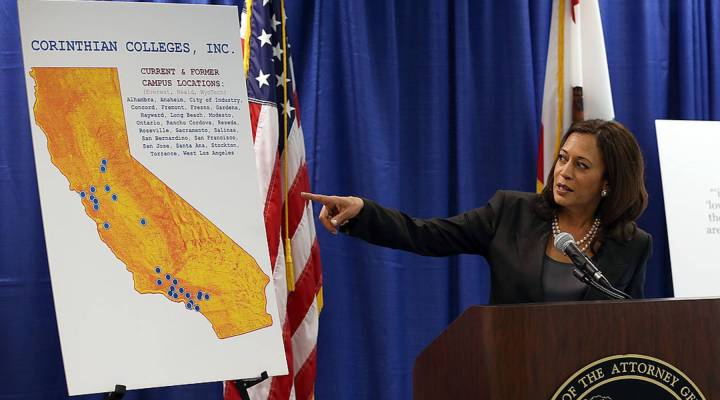
Thousands of former students apply for debt relief

In 2007, Pamela Hunt had just finished her bachelor’s degree at the University of Connecticut when she saw an ad online for Everest University.
“You know, if you were a single mom, underemployed, this would be perfect,” she recalled. “They had a great job placement.”
Hunt, who has five children, wanted to be a probation officer. Two years later, she had a master’s in criminal justice from Everest’s online program, but all those promises of job placement amounted to little more than a few emailed links to job search websites. Everest’s parent company, Corinthian Colleges, was later fined $30 million for inflating its job placement figures. Last spring the company was forced out of business amid charges of widespread fraud and deception.
“Needless to say, I’ve never been employed in my field of study,” Hunt said.
Now Hunt is making less than $15 an hour as a home health aide. Between her two degrees, she said she has $159,000 in student loan debt.
Last May she applied to have her Everest loans forgiven, through a little-known part of federal law.
“If the college lied about anything that relates to the loans or the education, potentially the loans could be canceled,” said financial aid expert Mark Kantrowitz with Cappex.com. “It’s incredibly vague.”
The government has agreed to write off about $28 million dollars in debt for some former Corinthian students, but thousands more borrowers, like Hunt, are still waiting for answers.
According to the Debt Collective, an advocacy group for borrowers, former students from other for-profit colleges, like ITT Tech and the Art Institutes, have also filed claims. About 50 students of DeVry University have applied through the Debt Collective’s website, according to the group’s legal coordinator Luke Herrine. On Wednesday the Federal Trade Commission announced it is suing DeVry for allegedly inflating its job placement and graduation rates.
For many borrowers, the so-called “defense to repayment” provision in the Higher Education Act may be the only hope to escape crushing debt, said Herrine.
“Student loans are almost never dischargeable in bankruptcy,” he said. “Even if you took out the loan for a fraudulent product, you can’t get out of them, unless the defense to repayment provision would actually work.”
The Education Department has begun a months-long process to negotiate clear rules to determine who qualifies for relief, said Robyn Smith with the National Consumer Law Center.
“We are looking at a very long process for students, which is why we are calling on the department to immediately stop collecting on student loans once students assert a defense to repayment claim, regardless of the school that they went to,” she said.
More than 7,500 students have applied for debt relief in the last six months, according to the department. If that sounds like a lot, Smith said, hundreds of thousands should be eligible.
There’s a lot happening in the world. Through it all, Marketplace is here for you.
You rely on Marketplace to break down the world’s events and tell you how it affects you in a fact-based, approachable way. We rely on your financial support to keep making that possible.
Your donation today powers the independent journalism that you rely on. For just $5/month, you can help sustain Marketplace so we can keep reporting on the things that matter to you.












